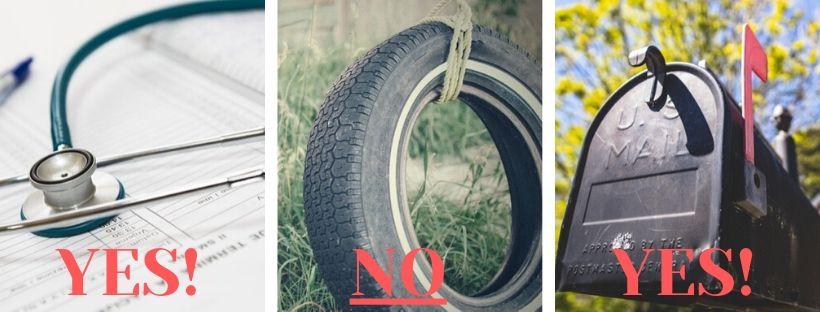Yes I should shred this? Or no I shouldn’t shred this??

Do you know what things you should be securely shredding? There are certain things that probably seem obvious to you, and you’ve got a plan to securely destroy them. Other things that are currently making their way into your recycling bin will likely find their way into a pile of items that you will now securely shred after you read this!
The three things we’re going to review this month for secure destruction are medical bills and records, tires, and direct mail pieces. Should they all be securely destroyed?
Medical Bills and Records
This one is probably obvious to most people. Yes, you need to securely destroy medical bills and records. But how often should you securely destroy them? Should you keep them in a secure file for longer than a year, or should you maintain seven years of your medical records like you would for your taxes?
At a minimum, experts recommend keeping your medical bills and statements from hospitals and clinics for a year. If you’re submitting receipts for reimbursements, or need to dispute a charge, having the original bills will be critical. However, after a year, secure destruction is the best option to free up some space in your filing cabinet, and give you a little peace of mind.
As for medical records, some experts recommend keeping records of diagnoses and treatment forever. According to healthinfolaw.org, MN law requires hospitals to retain medical records for seven years. The hospital medical records must include basic identifying information about the patient as well as clinical data regarding diagnosis and treatment.
Tires
You could choose to shred them to upcycle old tires into playground fill or rubber mulch, but old tires are not something you need to securely destroy. Most tire stores will take your old tires and recycle them safely. However, if you’re waiting to do something crafty and green with your old tires, here are a couple of other ways to upcycle your old tires.
Direct Mail
It might not seem like your direct mail could tell someone a lot about you. However, have you googled yourself using your first name, last name and address (all of the things on a harmless piece of direct mail)? Then combine it with your other social profiles, and it’s amazing just how much the internet knows about you. Here’s an article that details what Google might know about you, and how you can change some settings to control how much Google knows about you moving forward. So if you are just placing your direct mail in your recycling bin, you might want to consider putting it into a pile you’re making for items you need to securely shred.
In review, you should say yes to shredding medical records and bills if the time is right, and yes to securely shredding your direct mail. Let your tires get recycled by your local tire store, and you’ll be two steps closer to keeping your data safer.
